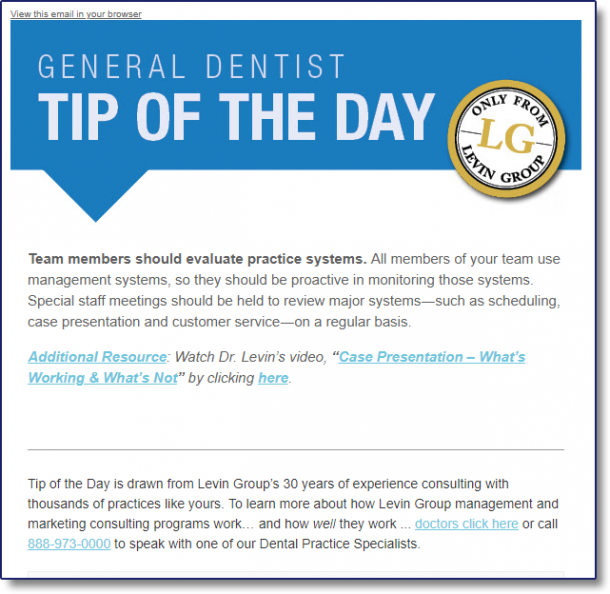Systems, systems, systems! Either you got good ones or you don’t. If you don’t, you’re asking for trouble!
Here’s the problem: most dentists think they have good systems when, in fact, they don’t. Sure, at one time, the systems were effective and efficient, but that was years ago. Management and marketing systems have a shelf life of about three years when they’re operating at peak efficiency.
After that, things slow down. As the practice continues to evolve, the old systems can’t keep up and they begin breaking down more and more frequently.
Doctors and team members will get out “the duct tape” to keep the systems running, but bottlenecks continue to multiply, forcing the staff to improvise work-a-rounds and other fixes that, of course, create additional problems. Before long, those once sleek, simple, super-efficient systems have transmogrified into a Rube Goldbergian nightmare. It takes more and more effort to get less and less done. Not a good situation for you, your team or your patients.
Yet dentists insist on holding onto outdated, production-killing, morale-destroying systems. Why? Here are the top four excuses dentists make for keeping bad systems:
1. It’s going to take too much time to replace the systems
You can’t expect to snap your fingers and have new systems like that. A better way to look at it is that new systems are an investment in your practice… in your sanity… and your financial well-being.
If your outdated systems aren’t working well now, what will they be like a year from now? How high will he stress be in your practice? How long will your team agree to keep working under such conditions… before they start looking for opportunities elsewhere?
2. It won’t be worth it
Can you remember what was it like when your current systems were new? How the days seemed to fly by with few problems? Patients weren’t backed up in the reception area. Stress was low or nearly nonexistent. And you weren’t putting in extra time in the office and at home, thinking about the practice 24/7.
You can’t go back to those easier, stress-free days with your current systems. But if you could get a better practice and a better life with new systems, would it be worth it?
3. We fixed systems before and nothing happened
Fixing systems isn’t replacing them. And that’s what you’ve got to do when systems become outdated. Your practice is continually evolving, and new systems can absorb only so many changes before they start to flounder. Think of all the changes that have occurred in your practice in the past three years regarding technology, supplies, personnel, protocols, equipment, etc.
I bet it’s a pretty substantial list, yet you’re operating with basically the same systems before any of those changes happened. It’s like running new software on an old computer. It either won’t work or it runs so slowly that you finally throw your hands up in frustration.
4. My team doesn’t want to change
It happens. Teams get comfortable with the status quo. But if your practice isn’t performing to your satisfaction, then it’s up to you to change it.
After all, you want to get the most out of your career. You don’t want to settle for lower income and lower profitability… just because your team is happy with the way things are.
Sure, you want your team’s input on how to improve the practice, but keeping everything the same shouldn’t be an option.
Conclusion
Your practice is a Ferrari. You can’t expect it to operate at peak performance if there’s a lawnmower engine under the hood. That’s what happens with old systems––they prevent you from reaching your practice’s full potential. Who wants to be puttering down the road when you could be flying full speed ahead into a much brighter future?
Additional Resources
- Not sure about the quality of your systems? Get a Practice Performance Analysis. Click here to learn more.
- Download Dr. Levin’s free whitepaper, “How to Increase the Income from Your Practice,” by clicking here.
[thb_button link=”https://levingroup.com/practicesuccess/” class=”pull-right” style=”” rounded=”” color=”black” icon=”” size=”medium” animation=”right” ]Back to Practice Success Archive »[/thb_button]
